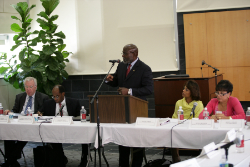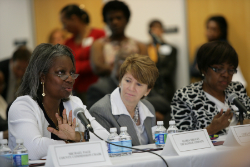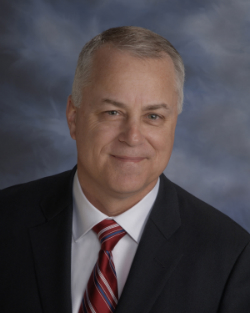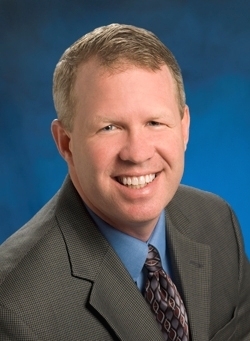Archive for June, 2011
Wednesday, June 22nd, 2011
The University of North Carolina Board of Governors has approved a request from North Carolina Central University to plan a doctor of philosophy (Ph.D.) program in integrated biosciences. If the planning proceeds on schedule, the program would accept its first students in fall 2012, and could award its degrees four years later. They would be the first Ph.D.s awarded by the university in more than 50 years.
According to NCCU’s proposal, the interdisciplinary doctorate would be offered on two tracks, biomedical sciences and pharmaceutical sciences. Administratively the program would be housed in the College of Science and Technology, but it also would draw on resources of NCCU’s Julius L. Chambers Biomedical/Biotechnology Research Institute (JLC–BBRI), the Biomanufacturing Research Institute and Technology Enterprise (BRITE) and the School of Library and Information Sciences. The curriculum will include offerings from the life sciences, physical sciences, computation and information sciences, pharmaceutical sciences and mathematics.
The decision to offer a Ph.D. in these areas reflects NCCU’s growing research capacity in health disparities and drug discovery, said Hazell Reed, vice chancellor for graduate education and research. “That’s where our strengths are,” he said, “We have the faculty in place to do it, and we have state-of-the-art research and laboratory facilities. We’re determined to build a very, very strong program in integrated biosciences that is competitive with any in the country.”
Research involving health disparities — the gaps between the health status of the nation’s racial and ethnic minorities compared with the population as a whole — has been explicitly part of the mission of BBRI since it opened in 1999, and a key focus of other NCCU science and public health programs for decades.
NCCU expects the program to reach an enrollment of about 20 full-time students in its fourth year of operation, and to graduate about five per year. An additional aim of the program is to expand the number of minority scientists, particularly African-Americans, in biomedical research. A recent report by the National Science Foundation noted that African-Americans make up about 12 percent of the U.S. population, but account for only 3 percent of the work force of scientists and engineers.
“We want good students, period, without regard to race or ethnicity,” Reed said, “but NCCU has a commitment to drawing more minorities and women into the STEM (science, technology, engineering and math) disciplines. We want to ensure that we have a diverse student body.”
NCCU had a doctoral program in the mid-20th century that was short-lived but historically significant. From 1955 to 1964, five people earned the Ph.D. from the institution then known as North Carolina College at Durham, all in the field of education. The degree received in 1955 by Walter M. Brown, a future dean of the NCCU School of Education, was the first Ph.D. awarded by a historically black college or university in the United States. As of the late 1960s, North Carolina College and Howard University were the only black colleges to have awarded the degree.
Posted in Public Affairs | 4 Comments »
Wednesday, June 22nd, 2011
For the fifth consecutive year The Triangle Association of Black Journalists will share information on working with the media and getting coverage on television, radio and in print with local non-profit organizations at their “Making News” Media Access Workshop , July 7th at 9:30am in the School of Education Auditorium at NC Central University.
The free workshop will consist of a panel of local media and business professionals who will share their expertise on newsgathering and working with the public on developing news stories, talk show segments, public service announcements and initiatives as well as commercial advertising. Non-profit organizations and small business owners will learn how to work with news organizations and write effective press releases, public service announcements and learn the best ways to get their story covered and gain much needed publicity for their organization and its events. Attendees will also learn of other means and outlets available to get publicity including public service announcements, social media, commercials and online media.
The workshop will be moderated by past panelist, WRAL-TV/Fox 50 Anchor/Reporter Ken Smith. Confirmed speakers now include ABC-11/CW22 News Anchor Tisha Powell to share her expertise in Television News reporting and to give his perspective on how to get a story in print, Durham Herald Sun Reporter John McCann. The panel also includes James Wong, Communications Manager of iContact, and Ayana Hernandez, Vice President of Fleishmann-Hillard Inc. to date. Past speakers included Gurnal Scott, WPTF-AM News Anchor/Reporter, Brett Chambers, NC Central University , Stan Chambers and Lynn Bonner, Reporters, The News and Observer and WTVD-TV Reporter/Anchor Anthony Wilson.
NC Central University are the sponsors for this event.
Posted in Public Affairs | Comments Off on Tisha Powell, Ken Smith and John McCann added to TABJ Media Workshop
Monday, June 20th, 2011
North Carolina Central University is winding down the final weeks of a two-year grant aimed at educating teens on campus and in the Durham community about the dangers of alcohol consumption.
The initiative – dubbed Project SUCCESS – is living up to its name through outreach to hundreds of students in middle school, high school and college. Under the grant, NCCU students are trained as peer educators to counsel fellow students, lead interventions and provide accurate, culturally relevant information on alcohol abuse. The peer educators also talk to local middle- and high-school classes to encourage teens to make healthy choices.
“Alcohol use and abuse is a serious problem, and we’re trying to educate our students as well as the students in the public school system about the seriousness of the problem,” said Dr. Carolyn Moore, director of the NCCU Counseling Center, which received the grant. “It’s important to get them young.”
The $111,750 grant was awarded by the Durham County Alcohol Beverage Control Board. The university has used the money to create the program and training, and help pay for several campus-produced videos featuring NCCU students discussing the perils of alcohol addiction, binge drinking, drunken driving and other harmful behaviors. The videos are being shown on campus and in the public schools.
The project’s accomplishments also include:
- Training 12 peer educators
- Training four “Durham Eagles in Action” —NCCU students who graduated from Durham schools and present the program to middle- and high-school students.
- Outreach to 82 ninth-graders at Southern High School and 41 eighth-graders at Rogers Herr Magnet Middle School. Presentations are scheduled for drivers’ education classes at Hillside High School on Tuesday and Northern High School on Wednesday.
Although the grant runs out at the end of this month, Moore said, the university plans to continue the program and apply for additional funding.
The grant was the first of its kind for the board and was paid for with proceeds collected from the sale of alcohol, said board chairwoman Emily Page. The agency will receive a report on the results once the program concludes.
“We are happy to have the opportunity to impact the community by partnering with NCCU to ensure that their students and the students of the Durham Public Schools are benefiting from some innovative and relatable alcohol prevention education,” Page said.
The university also used a portion of the money for an online alcohol-education course for new students. Last fall, more than 1,000 incoming freshman took the two-hour, noncredit course as a mandatory part of orientation. The interactive course features a series of modules and tests with a certificate for passing. The certificate is required as admission to the Freshman Party, a social event hosted by the campus for incoming freshman.
“For students coming in the door, they recognize that we see the complete student,” Moore said. “Their social behavior is just as important to us as their academic behavior. We want them to enjoy themselves in safe and healthy ways, and learn to make good decisions.”
Posted in Public Affairs | 9 Comments »
Monday, June 20th, 2011
The NCCU Board of Trustees is scheduled to meet on Tuesday, June 21 at the Radisson Hotel Research Triangle Park and Wednesday, June 22 in the Emma Marable Conference Room of the William Jones Building. Click here to view agenda.
Posted in Public Affairs | 4 Comments »
Tuesday, June 14th, 2011
LIFETIME ACHIEVEMENT IN JAZZ
Jimmy Heath
MUSICIAN OF THE YEAR
Sonny Rollins
COMPOSER OF THE YEAR
Jason Moran
UP AND COMING ARTIST OF THE YEAR
Ambrose Akinmusire
RECORDING OF THE YEAR
Bird Songs
Joe Lovano Us Five (Blue Note)
HISTORICAL RECORDING, BOXED SET OR SINGLE CD REISSUE OF THE YEAR
The Complete 1932-1940 Brunswick, Columbia, and Master Recordings of Duke Ellington and His Famous Orchestra – Duke Ellington (Mosaic)
RECORD LABEL OF THE YEAR
Blue Note
FEMALE SINGER OF THE YEAR
Dee Dee Bridgewater
MALE SINGER OF THE YEAR
Kurt Elling
LARGE ENSEMBLE OF THE YEAR
Mingus Big Band
SMALL ENSEMBLE OF THE YEAR
Joe Lovano Us Five
ARRANGER OF THE YEAR
Bill Holman
TRUMPETER OF THE YEAR
Ambrose Akinmusire
TROMBONIST OF THE YEAR
Wycliffe Gordon
TENOR SAXOPHONIST OF THE YEAR
Sonny Rollins
ALTO SAXOPHONIST OF THE YEAR
Rudresh Mahanthappa
BARITONE SAXOPHONIST OF THE YEAR
James Carter
SOPRANO SAXOPHONIST OF THE YEAR
Jane Ira Bloom
CLARINETIST OF THE YEAR
Anat Cohen
FLUTIST OF THE YEAR
Nicole Mitchell
GUITARIST OF THE YEAR
Russell Malone
PIANIST OF THE YEAR
Fred Hersch
BASSIST OF THE YEAR
Christian McBride
DRUMMER OF THE YEAR
Matt Wilson
PERCUSSIONIST OF THE YEAR
Bobby Sanabria
ORGANIST/KEYBOARDIST OF THE YEAR
Dr. Lonnie Smith
MALLET INSTRUMENTALIST OF THE YEAR
Stefon Harris
VIOLINIST OF THE YEAR
Billy Bang
PLAYER OF THE YEAR INSTRUMENTS RARE IN JAZZ
Toots Thielemans, harmonica
PERIODICAL/WEBSITE OF THE YEAR
JazzTimes
BLOG OF THE YEAR
A Blog Supreme, by Patrick Jarenwattananon
BEST BOOK ABOUT JAZZ
I Walked With Giants: The Autobiography of Jimmy Heath, by Jimmy Heath and Joseph McLaren (Temple University Press)
BEST LINER NOTES OF THE YEAR
Steven Lasker – The Complete 1932-1940 Brunswick, Columbia, and Master Recordings of Duke Ellington and His Famous Orchestra (Mosaic)
THE HELEN DANCE-ROBERT PALMER AWARD FOR REVIEW AND FEATURE WRITING
Nate Chinen
THE WILLIS CONOVER–MARIAN MCPARTLAND AWARD FOR BROADCASTING
Phil Schaap
THE LONA FOOTE- BOB PARENT AWARD FOR PHOTOGRAPHY
Jimmy Katz
LIFETIME ACHIEVEMENT IN JAZZ JOURNALISM
Bill Milkowski
SHORT FORM VIDEO OF THE YEAR
Sonny Rollins: Getting It Back Together – Bret Primack, producer/director
PHOTO OF THE YEAR
Sonny Rollins by John Abbott
2011 JAZZ HEROES
JJA ‘Jazz Heroes’ are activists, advocates, altruists, aiders and abettors of jazz who have had significant impact in their local communities.
Omrao Brown Washington, D.C.
Peggy Cafritz Washington, D.C.
John Gilbreath Seattle
Dr. Maitreya Padukone New York
Don Z. Miller Phoenix
Ed Reed Richmond, CA
Mike Reed Chicago
Roger Spencer and Lori Mechem Nashville
Elynor Walcott and sons Paul, Frank and Lloyd Poindexter Boston
Posted in Music News | 8 Comments »
Tuesday, June 14th, 2011
 Members of President Barack Obama’s Council on Jobs and Competitiveness came to North Carolina Central University on Monday morning seeking ideas and suggestions from local leaders about how to accelerate job growth and economic development. And they did not leave empty-handed. Members of President Barack Obama’s Council on Jobs and Competitiveness came to North Carolina Central University on Monday morning seeking ideas and suggestions from local leaders about how to accelerate job growth and economic development. And they did not leave empty-handed.
In a spirited 90-minute round-table discussion, representatives of Research Triangle businesses, nonprofits, governments and educational institutions offered their views about policies and strategies that promote job creation, and about those that impede it.
The session at NCCU was one of five similar gatherings in the region held in conjunction with Obama’s visit to Durham later in the day, which included a speech at Cree, the LED lighting manufacturer.
Session moderator Melody Barnes, a White House domestic policy advisor, said the national job picture is slowly improving, “but we started from such a deep hole.” North Carolina was chosen as the site for Monday’s meetings “because of what you’re doing,” she said. The Research Triangle is notable for its “dramatic focus on innovation” and for its collaborations between the public and private sectors, she said, adding, “We want to take those lessons to the rest of the country for job-creation purposes.”
Many of the speakers at the NCCU session praised the local business climate. Among them was Cheznee Johnson, a communications manager at Merck & Co., which operates a vaccine manufacturing plant in Durham. “We’ve expanded four times” since the plant opened in 2004, she said, adding that the plant is adding 130 jobs this year, bringing the workforce to 750. The attractions of the location, she said, are three: the quality of the labor pool, thanks to the training provided institutions such as NCCU, Durham Tech and N.C. State University; the incentives offered by the state, and the “quality of life.” “North Carolina is great for biotechnology,” she said.
 DeLisa Alexander, an executive at Red Hat, the Raleigh-based software company, said, “Our competitive advantage is our workforce.” She praised the quality of the workers educated at local universities and community colleges, but said the company was nonetheless contending with a “talent squeeze.” “We need more individuals skilled in the technologies of the future,” she said. It is vital, she said, to get more people into the technology pipeline by reaching out to elementary and middle schools to interest children in careers in science and technology. DeLisa Alexander, an executive at Red Hat, the Raleigh-based software company, said, “Our competitive advantage is our workforce.” She praised the quality of the workers educated at local universities and community colleges, but said the company was nonetheless contending with a “talent squeeze.” “We need more individuals skilled in the technologies of the future,” she said. It is vital, she said, to get more people into the technology pipeline by reaching out to elementary and middle schools to interest children in careers in science and technology.
Casey Steinbacher, president and CEO of the Greater Durham Chamber of Commerce, described her organization’s efforts to encourage companies to start or expand businesses in Durham. The chamber has focused on establishing “peer networks” among entrepreneurs to enhance the region’s entrepreneurial climate. “Job growth comes from smaller companies,” she said. “We try to attract smart people who want to start their own business.”
Other speakers touched on a range of topics, including:
- The need to improve access to government and commercial contracts for small businesses, particularly those owned by women and minorities.
- The need to expand the availability of affordable child care, so that women — who now earn the majority of baccalaureate and graduate degrees — can have easier access to the job market.
- Obstacles faced by Hispanic immigrants in gaining access to education and job training.
Glenn Adams, a Fayetteville lawyer and chairman of the NCCU Board of Trustees, was one of several speakers who pointed out that reductions in federal Pell Grants and other financial aid to students have had the effect of stifling entrepreneurship and job creation. “Students who graduate from college with heavy debts need jobs right away,” he said. “You can’t be an entrepreneur who’s creating jobs if you need to repay your loans.”
Posted in Public Affairs | 7 Comments »
Saturday, June 11th, 2011
 The North Carolina Central University School of Education will hold its third annual Summer Technology Institute, “Preparing 21st Century Educators as Technology Leaders to Teach Millennial Students,” on June 23 and 24. The Institute will take place in the H.M. Michaux Jr. School of Education from 8 a.m. to 4:30 p.m. both days. The North Carolina Central University School of Education will hold its third annual Summer Technology Institute, “Preparing 21st Century Educators as Technology Leaders to Teach Millennial Students,” on June 23 and 24. The Institute will take place in the H.M. Michaux Jr. School of Education from 8 a.m. to 4:30 p.m. both days.
Anthony Tata, superintendent of the Wake County Public School System, and Bruce Friend, director of SAS Curriculum Pathways, will offer keynote addresses.
Tata served as chief operating officer of the District of Columbia Public Schools before joining the Wake County school system in January. A retired brigadier general, Tata served 28 years in the U.S. Army.
For the past decade, Friend has been working in online education as the chief administrator for two virtual schools, one in Florida and one in Raleigh. Most recently he guided the creation of online programs in South Carolina and North Carolina. Before SAS, Friend served as the vice president for the North American Council of Online Learning, a nonprofit  organization providing support to students, parents and online learning programs. organization providing support to students, parents and online learning programs.
The two-day event at NCCU will offer a variety of workshops, including:
- Using Smartboards to teach mathematics, science, social studies and language arts;
- Google apps in the classroom;
- Using Hyperstudio 5 to create digital content;
- Using iPads and and smartphones to enhance instruction;
- Using social networks to support instruction and teaching with Elluminate.
Those wishing to take part in the Summer Technology Institute must register by June 15. Lunch will be provided both days. For further information, contact Edith Thorpe at 919-530-6689 or visit the website at www.nccu.edu/academics/sc/soe/.
Posted in Public Affairs | 4 Comments »
Wednesday, June 1st, 2011
 Cal Tjader was undoubtedly the most famous non-Latino leader of Latin jazz bands, an extraordinary distinction. From the 1950s until his death, he was practically the point man between the worlds of Latin jazz and mainstream bop; his light, rhythmic, joyous vibraphone manner could comfortably embrace both styles. His numerous recordings for Fantasy and Verve and long-standing presence in the San Francisco Bay Area eventually had a profound influence upon Carlos Santana, and thus Latin rock. He also played drums and bongos, the latter most notably on the George Shearing Quintet’s puckishly titled “Rap Your Troubles in Drums,” and would occasionally sit in on piano as well. Cal Tjader was undoubtedly the most famous non-Latino leader of Latin jazz bands, an extraordinary distinction. From the 1950s until his death, he was practically the point man between the worlds of Latin jazz and mainstream bop; his light, rhythmic, joyous vibraphone manner could comfortably embrace both styles. His numerous recordings for Fantasy and Verve and long-standing presence in the San Francisco Bay Area eventually had a profound influence upon Carlos Santana, and thus Latin rock. He also played drums and bongos, the latter most notably on the George Shearing Quintet’s puckishly titled “Rap Your Troubles in Drums,” and would occasionally sit in on piano as well.
Tjader studied music and education at San Francisco State College before hooking up with fellow Bay Area resident Dave Brubeck as the drummer in the Brubeck Trio from 1949 to 1951. He then worked with Alvino Rey, led his own group, and in 1953, joined George Shearing’s then hugely popular quintet as a vibraphonist and percussionist. It was in Shearing’s band that Tjader’s love affair with Latin music began. It was ignited by Shearing’s bassist Al McKibbon, nurtured by contact with Willie Bobo, Mongo Santamaria, and Armando Peraza, and galvanized by the ’50s mambo craze.
 When he left Shearing the following year, Tjader promptly formed his own band that emphasized the Latin element yet also played mainstream jazz. Bobo and Santamaria eventually joined Tjader’s band as sidemen, and Vince Guaraldi served for a while as pianist and contributor to the band’s songbook (“Ginza,” “Thinking of You, MJQ”). Tjader recorded a long series of mostly Latin jazz albums for Fantasy from the mid-’50s through the early ’60s, switching in 1961 to Verve. Under Creed Taylor’s aegis, he expanded his stylistic palette and was teamed with artists like Lalo Schifrin, Anita O’Day, Kenny Burrell, and Donald Byrd. Along the way, Tjader managed to score a minor hit in 1965 with “Soul Sauce,” a reworking of Dizzy Gillespie/Chano Pozo’s “Guacha Guaro,” which Tjader had previously cut for Fantasy. Tjader returned to Fantasy in the 1970s, then in 1979 moved over to the new Concord Picante label, where he remained until his death. When he left Shearing the following year, Tjader promptly formed his own band that emphasized the Latin element yet also played mainstream jazz. Bobo and Santamaria eventually joined Tjader’s band as sidemen, and Vince Guaraldi served for a while as pianist and contributor to the band’s songbook (“Ginza,” “Thinking of You, MJQ”). Tjader recorded a long series of mostly Latin jazz albums for Fantasy from the mid-’50s through the early ’60s, switching in 1961 to Verve. Under Creed Taylor’s aegis, he expanded his stylistic palette and was teamed with artists like Lalo Schifrin, Anita O’Day, Kenny Burrell, and Donald Byrd. Along the way, Tjader managed to score a minor hit in 1965 with “Soul Sauce,” a reworking of Dizzy Gillespie/Chano Pozo’s “Guacha Guaro,” which Tjader had previously cut for Fantasy. Tjader returned to Fantasy in the 1970s, then in 1979 moved over to the new Concord Picante label, where he remained until his death.
~ Richard S. Ginell, Rovi
http://mog.com/artists/bio/mn4908/cal-tjader
Posted in Artist of the Month | 6 Comments »
|


 Members of President Barack Obama’s Council on Jobs and Competitiveness came to North Carolina Central University on Monday morning seeking ideas and suggestions from local leaders about how to accelerate job growth and economic development. And they did not leave empty-handed.
Members of President Barack Obama’s Council on Jobs and Competitiveness came to North Carolina Central University on Monday morning seeking ideas and suggestions from local leaders about how to accelerate job growth and economic development. And they did not leave empty-handed. DeLisa Alexander, an executive at Red Hat, the Raleigh-based software company, said, “Our competitive advantage is our workforce.” She praised the quality of the workers educated at local universities and community colleges, but said the company was nonetheless contending with a “talent squeeze.” “We need more individuals skilled in the technologies of the future,” she said. It is vital, she said, to get more people into the technology pipeline by reaching out to elementary and middle schools to interest children in careers in science and technology.
DeLisa Alexander, an executive at Red Hat, the Raleigh-based software company, said, “Our competitive advantage is our workforce.” She praised the quality of the workers educated at local universities and community colleges, but said the company was nonetheless contending with a “talent squeeze.” “We need more individuals skilled in the technologies of the future,” she said. It is vital, she said, to get more people into the technology pipeline by reaching out to elementary and middle schools to interest children in careers in science and technology. The North Carolina Central University School of Education will hold its third annual Summer Technology Institute, “Preparing 21st Century Educators as Technology Leaders to Teach Millennial Students,” on June 23 and 24. The Institute will take place in the H.M. Michaux Jr. School of Education from 8 a.m. to 4:30 p.m. both days.
The North Carolina Central University School of Education will hold its third annual Summer Technology Institute, “Preparing 21st Century Educators as Technology Leaders to Teach Millennial Students,” on June 23 and 24. The Institute will take place in the H.M. Michaux Jr. School of Education from 8 a.m. to 4:30 p.m. both days. organization providing support to students, parents and online learning programs.
organization providing support to students, parents and online learning programs. Cal Tjader was undoubtedly the most famous non-Latino leader of Latin jazz bands, an extraordinary distinction. From the 1950s until his death, he was practically the point man between the worlds of Latin jazz and mainstream bop; his light, rhythmic, joyous vibraphone manner could comfortably embrace both styles. His numerous recordings for Fantasy and Verve and long-standing presence in the San Francisco Bay Area eventually had a profound influence upon Carlos Santana, and thus Latin rock. He also played drums and bongos, the latter most notably on the George Shearing Quintet’s puckishly titled “Rap Your Troubles in Drums,” and would occasionally sit in on piano as well.
Cal Tjader was undoubtedly the most famous non-Latino leader of Latin jazz bands, an extraordinary distinction. From the 1950s until his death, he was practically the point man between the worlds of Latin jazz and mainstream bop; his light, rhythmic, joyous vibraphone manner could comfortably embrace both styles. His numerous recordings for Fantasy and Verve and long-standing presence in the San Francisco Bay Area eventually had a profound influence upon Carlos Santana, and thus Latin rock. He also played drums and bongos, the latter most notably on the George Shearing Quintet’s puckishly titled “Rap Your Troubles in Drums,” and would occasionally sit in on piano as well. When he left Shearing the following year, Tjader promptly formed his own band that emphasized the Latin element yet also played mainstream jazz. Bobo and Santamaria eventually joined Tjader’s band as sidemen, and Vince Guaraldi served for a while as pianist and contributor to the band’s songbook (“Ginza,” “Thinking of You, MJQ”). Tjader recorded a long series of mostly Latin jazz albums for Fantasy from the mid-’50s through the early ’60s, switching in 1961 to Verve. Under Creed Taylor’s aegis, he expanded his stylistic palette and was teamed with artists like Lalo Schifrin, Anita O’Day, Kenny Burrell, and Donald Byrd. Along the way, Tjader managed to score a minor hit in 1965 with “Soul Sauce,” a reworking of Dizzy Gillespie/Chano Pozo’s “Guacha Guaro,” which Tjader had previously cut for Fantasy. Tjader returned to Fantasy in the 1970s, then in 1979 moved over to the new Concord Picante label, where he remained until his death.
When he left Shearing the following year, Tjader promptly formed his own band that emphasized the Latin element yet also played mainstream jazz. Bobo and Santamaria eventually joined Tjader’s band as sidemen, and Vince Guaraldi served for a while as pianist and contributor to the band’s songbook (“Ginza,” “Thinking of You, MJQ”). Tjader recorded a long series of mostly Latin jazz albums for Fantasy from the mid-’50s through the early ’60s, switching in 1961 to Verve. Under Creed Taylor’s aegis, he expanded his stylistic palette and was teamed with artists like Lalo Schifrin, Anita O’Day, Kenny Burrell, and Donald Byrd. Along the way, Tjader managed to score a minor hit in 1965 with “Soul Sauce,” a reworking of Dizzy Gillespie/Chano Pozo’s “Guacha Guaro,” which Tjader had previously cut for Fantasy. Tjader returned to Fantasy in the 1970s, then in 1979 moved over to the new Concord Picante label, where he remained until his death.